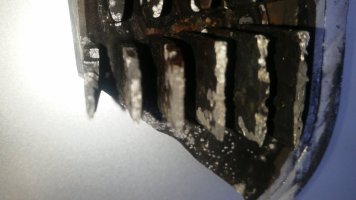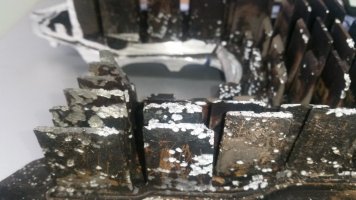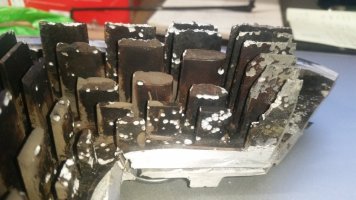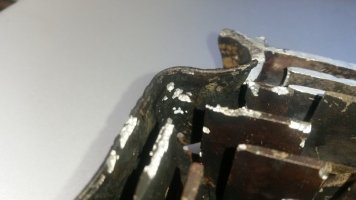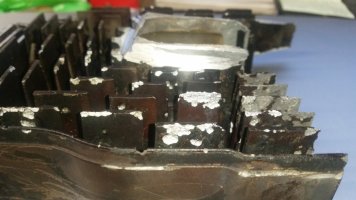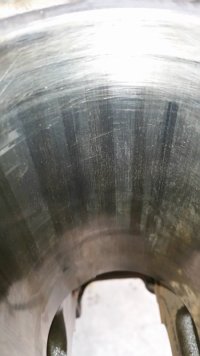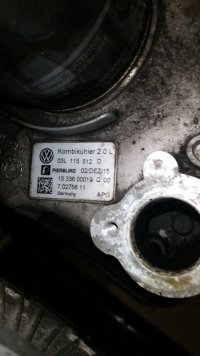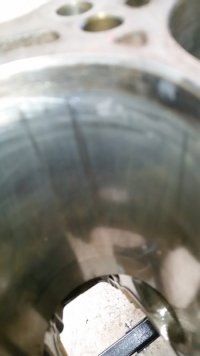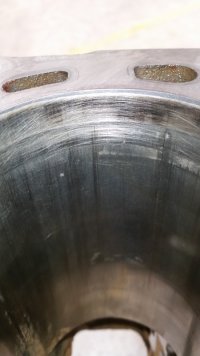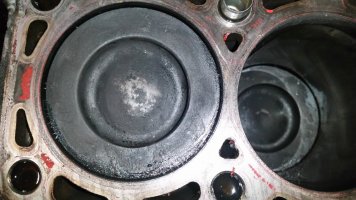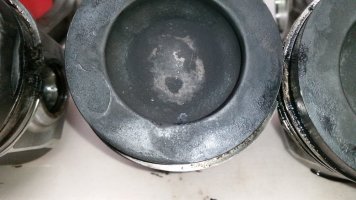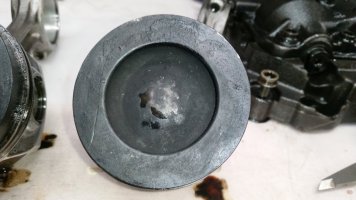Hi all
Just stripped down and rebuilt the engine on a 2016 T6 180 bi-turbo CFCA engine after it failed on the A557 heading for Widnes originally had the van recovered to VW van center Liverpool for repair as I thought it was just a failed injector.
After a couple of weeks, they said it had no compression on the number 4 cylinder and the heater plug tip had snapped off on the No 4 heater plug so gave them the go-ahead to remove the Cylinder head to diagnose the problem.
I was told the engine had been hydraulicked and no 4 cylinder was damaged so needed replacing at a cost of £ 12,000 I asked what the compression readings were for the other 3 cylinders and was shocked at how low they were this sent alarm bells ringing and I wanted to find out why the other 3 cylinders were so low given the vehicle had only covered 44,000 miles and had been serviced regularly.
So I collected the vehicle and started the process to find the reason for such an early failure as I am used to diesel engines doing 200,000 plus before needing major work or rebuild I do not have any ramps so set the van up on my trailer so I could remove the engine. Before starting the diagnostics and removal of the engine I got myself the workshop manual and VCDS and read the manual and learned how to use the VCDS diagnostics also followed all the threads I could about the issues with VW engines in particular the CFCA.
Before removing and disassembling the engine I had a quick look to see if anything was obvious apart from what I was told by VW the engine turned freely and I could clearly see the damage to no 4 cylinder in a gouge out of the cylinder wall causing the lack of compression as it was almost at the top of piston stroke and at the time of failure this would have caused the crankcase to pressurize forcing the engine oil out of the engine through the turbo seals and crankcase ventilator and into the inlet causing the plume of white smoke and loss of power I was just short of a junction so coasted off no bangs or crunches the engine still running with no power and lots of smoke.
The thing that caught my eye was that apart from the gouge in no 4 all the cylinders looked badly scored vertically with the top edge of the piston crownes worn this would account for the poor compression on the other cylinders if valves and head gaskets were sound on getting home and searching the internet for this I came across pictures of a CFCA engine with the same scoring to the bores and it suggested it was caused by EGR valve corrosion.
This is a long story with pictures and lots of evidence to shed some light on my problem but bear with me and I will post pictures when I work out how and continue the story to bring my findings to a close.
Would appreciate any comments
Just stripped down and rebuilt the engine on a 2016 T6 180 bi-turbo CFCA engine after it failed on the A557 heading for Widnes originally had the van recovered to VW van center Liverpool for repair as I thought it was just a failed injector.
After a couple of weeks, they said it had no compression on the number 4 cylinder and the heater plug tip had snapped off on the No 4 heater plug so gave them the go-ahead to remove the Cylinder head to diagnose the problem.
I was told the engine had been hydraulicked and no 4 cylinder was damaged so needed replacing at a cost of £ 12,000 I asked what the compression readings were for the other 3 cylinders and was shocked at how low they were this sent alarm bells ringing and I wanted to find out why the other 3 cylinders were so low given the vehicle had only covered 44,000 miles and had been serviced regularly.
So I collected the vehicle and started the process to find the reason for such an early failure as I am used to diesel engines doing 200,000 plus before needing major work or rebuild I do not have any ramps so set the van up on my trailer so I could remove the engine. Before starting the diagnostics and removal of the engine I got myself the workshop manual and VCDS and read the manual and learned how to use the VCDS diagnostics also followed all the threads I could about the issues with VW engines in particular the CFCA.
Before removing and disassembling the engine I had a quick look to see if anything was obvious apart from what I was told by VW the engine turned freely and I could clearly see the damage to no 4 cylinder in a gouge out of the cylinder wall causing the lack of compression as it was almost at the top of piston stroke and at the time of failure this would have caused the crankcase to pressurize forcing the engine oil out of the engine through the turbo seals and crankcase ventilator and into the inlet causing the plume of white smoke and loss of power I was just short of a junction so coasted off no bangs or crunches the engine still running with no power and lots of smoke.
The thing that caught my eye was that apart from the gouge in no 4 all the cylinders looked badly scored vertically with the top edge of the piston crownes worn this would account for the poor compression on the other cylinders if valves and head gaskets were sound on getting home and searching the internet for this I came across pictures of a CFCA engine with the same scoring to the bores and it suggested it was caused by EGR valve corrosion.
This is a long story with pictures and lots of evidence to shed some light on my problem but bear with me and I will post pictures when I work out how and continue the story to bring my findings to a close.
Would appreciate any comments
Last edited by a moderator:


